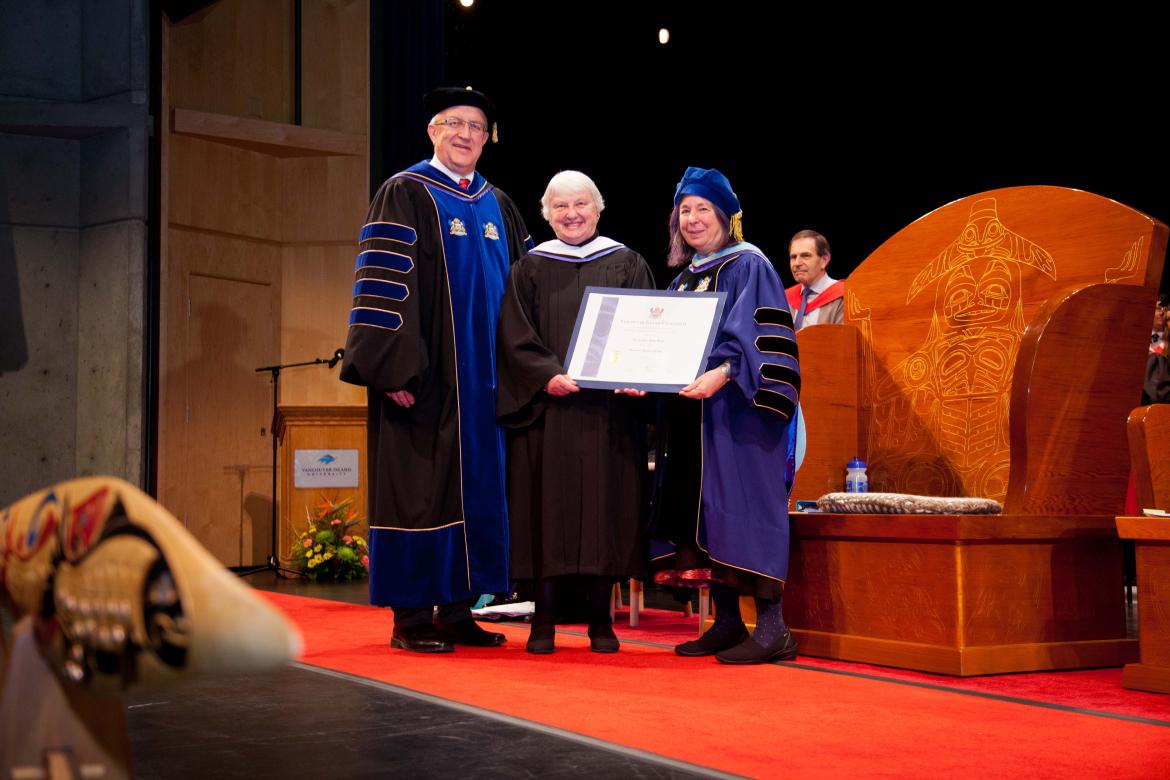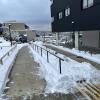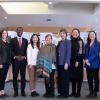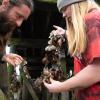
Longtime human rights advocate Dr. Jennifer Wade received an honorary degree from Vancouver Island University during the February 2 afternoon Convocation ceremony at the Port Theatre.
February 7, 2018 - 3:15pm
Dr. Jennifer Wade receives Doctor of Laws at February Convocation
As long as she can remember, Dr. Jennifer Wade has had a deep sense of the importance of fairness. Starting back on the playground at school, she has been fighting for people who haven’t been able to make their voices heard.
“I think it was my Scottish mother. She felt strongly about unfairness,” says Wade. “It was stressed to me, and I have distinct memories of defending children who were being teased or treated poorly on the school grounds.”
Service to others was a value in her home, growing up with a Canadian father who was a doctor in the British military and then Director of Mental Health in New Brunswick. With these influences, Wade was ready for the awakening she experienced when she moved from Fredericton, New Brunswick to London, England to do her postgraduate work. She read an article one morning on the London tube called The Forgotten Prisoners. It was the first article ever written about Amnesty International, and it exposed Wade to injustice in a way she had not yet encountered. It wasn’t long before she was volunteering for the organization. It was Amnesty International’s founding year, 1961, and she became involved with the work, learning as much as she could.
When later, she found herself living in Atlanta, Georgia, during the Civil Rights Movement in the United States, she applied to work with the Southern Regional Council during the Martin Luther King years. She remembers working alongside King and his wife, Coretta Scott King, among other major heavy-hitting fighters in the Movement like Stokely Carmichael.
“To this day, Coretta Scott King remains one of the most incredible human beings I have ever met,” Wade says. “Physically, spiritually, emotionally, intellectually – she was incredible. I think she provided such stability for her husband. Martin Luther King’s true gift was in speaking to the crowds. He could convince anyone to follow him. He was very skilled.”
She wrote copy and investigated cases in this job. Also, she was sent into the Atlanta State Penitentiary system to get information on black prisoners’ stories, and this was sad work.
This became a theme in Wade’s life – stepping into places many people would not tread. The young Canadian then with a two-year-old son simply went in and did the work asked of her.
“To tell the truth, the real fear was the government at the time. Those were the McCarthy years, and I found out that the RCMP began investigating me,” she says.
Wade’s ex-husband was an engineer, and received a dam-building contract in Pakistan in 1968. They packed up their two young sons – one was only six weeks old – and moved to the Indian Sub-continent.
“I found I had time on my hands, so I started going into the villages to see what we could do to help out,” Wade says.
She got money from a woman’s group – the wives whose husbands were engineers and planners on the dam were happy to make handicrafts and raise money. Most weeks though, Wade made the long journey into the villages by herself. She spear-headed building schools for girls and got shoes for the children’s feet so they did not have to walk the long hike on scorching, jagged rocks, and she started libraries mostly with National Geographic magazines. She helped to raise money for a buffalo so a local hospital could have milk.
“It was hard work, but very, very fulfilling,” she says. “Even then (in the 1970s), I saw the beginning of the madrasa schools. Attitudes about extreme Islam and ‘bad’ infidels were starting to be taught to children in those schools.”
Wade has taught at universities and colleges in the United States and Canada while she has devoted as much time as she could to human rights matters. During her time in the South, she taught at Emory University in Atlanta. She also gave some lectures at a literature class in Berkeley in California.
In 1974, when living in Vancouver and teaching in the English Department at the University of British Columbia, she co-founded the Vancouver chapter of Amnesty International. In 1976, Wade experienced her own personal crisis and was suddenly a single mother raising her two boys alone. Despite running her house and teaching, she still continued work with Amnesty.
In the years to come, she also worked with many other organizations including the Elizabeth Fry Society, the World Federalists, the United Nations Association and SOS Children’s Village Society. But a good part of her work has been trying to help individuals who are unable to speak for themselves for one reason or another.
It was also in the 1970s that Wade decided to invite a foster child into their home. Her foster daughter was 13 at the time – older than her boys, struggling, whip smart and a teenager. As a successful investment advisor in Toronto now, she still stays in touch with the Wade family and joins them for Christmas every year.
This experience taught Wade about the plight of foster children and made her want to do more. She began establishing “motivating scholarships” to benefit former-children-in-care, immigrants, and others who have experienced great difficulties and want to pursue post-secondary education. Her first scholarship went to a student who came to Malaspina College.
“Dr. Wade’s respect for the dignity of all people sets a great example for us, as a way to live our everyday lives,” says Dr. Ralph Nilson, President and Vice-Chancellor, Vancouver Island University. “Her reverence for the truth and belief in the power of education as an equalizing force in our society, as well as her track record in helping those who need help, are just some of the reasons we are honouring her today.”
Wade, now 80, has tenaciously taken on some major David and Goliath fights. She has sat in on controversial court cases and raised matters of concern that have arisen in these cases. She has also fought to ensure immigrants, refugees, poor people, and minorities are respected. She has done this despite being intimidated and sometimes fearful for her safety and the safety of those around her.
“Never underestimate the difference one voice can make. Get your facts straight and never think yourself a victim,” she says. “I’ve been fearful, but fear is what gets you down and keeps you down. Entire countries are ruined because of fear. I was pleased to have been given the Order of British Columbia even though I have criticized many social, political and religious organizations in the country when injustices have been perpetrated. I feel fortunate to live in a country where one can speak out and question authority. There are so many people in the world who do not live in such a place.”
-30-
MEDIA CONTACT:
Aly Winks, Communications Officer, Vancouver Island University
P: 250.740.6529 | C: 250.618.7930 | E: alyson.winks@viu.ca | T: @VIUNews
Tags: Convocation | Announcements





